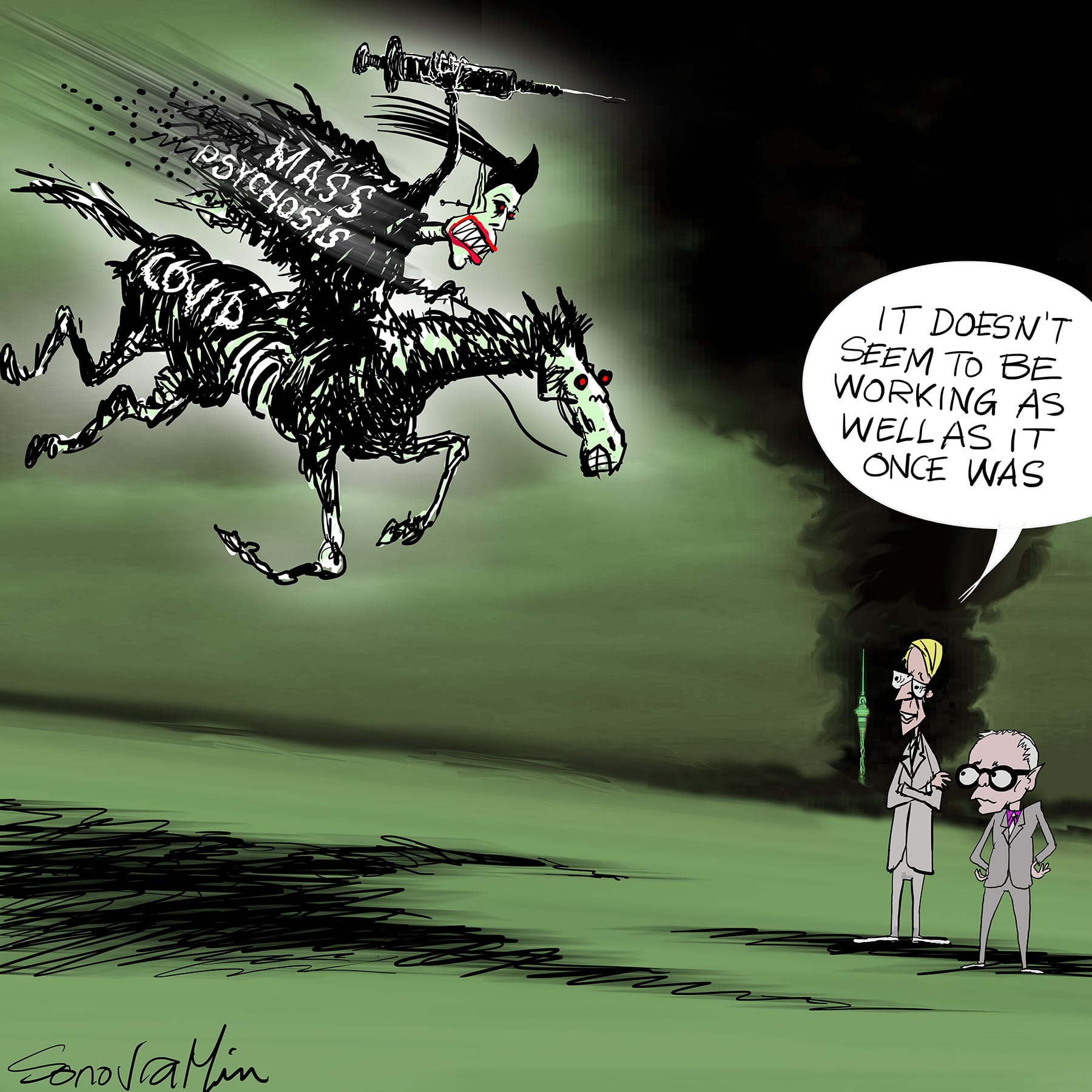Table of Contents
Dan Sanchez
fee.org
Dan Sanchez is the Director of Content at the Foundation for Economic Education (FEE) and the editor-in chief of FEE.org.
I don’t know about you, but I’ve been experiencing some serious “apocalypse fatigue.” For the past two years the news has been dominated by one world-threatening catastrophe after another.
It’s like the Four Horsemen of the Apocalypse are in a relay race.
Pestilence (COVID) only eased up on the horse whip after passing the baton to War (Russia invading Ukraine). And chomping at the bit is not only universal Death with the heightened risk of nuclear war between the US and Russia, but Famine, with President Biden warning darkly that food shortages “are gonna be real.”
Lovely.

What is especially wearying about this conga line of cataclysm is the extent to which the media whips up public panic with distorted, alarmist, and agenda-driven coverage of these very real problems, and how governments seize on that panic to ram through massive expansions of state power at the expense of individual liberty.
Indeed, that has long been the modus operandi of the US government, as economist Robert Higgs assiduously documented in several books, including Crisis and Leviathan and Resurgence of the Warfare State: The Crisis Since 9/11.
As I wrote for FEE on the recent anniversary of the 9/11 attacks in my article Twenty Years of Terror:
“The Global War on Terror set the standard for crisis response for the next twenty years. Every time the public is retraumatized by a new scare (like the financial crisis of 2008 or the COVID crisis we’re living through now), it responds by flocking in terror to the arms of the government.”
And what does the government do with that additional power? Invariably it paves the way for still more catastrophes down the road, creating a vicious cycle.
Are we condemned to perpetually ride this loop-de-loop of crises and power grabs until it finally crashes into totalitarianism or worse?
FEE’s founder Leonard Read would often ask a similar question in his standard seminar opening talk:
“Has there ever been an instance, historically, when a country has been on this toboggan and succeeded in reversing itself?”
Actually, yes there has been. Read cited England after the Napoleonic Wars.
“England’s debt,” at the time, as Read pointed out, “in relation to her resources, was larger than ours is now; her taxation was confiscatory; restrictions on the exchanges of goods and services were numerous, and there were strong controls on production and prices. Had it not been for the smugglers, many people would have starved!”
Post-war England was in a crisis and at a crossroads. But then, something glorious happened. Instead of barrelling on down the road to serfdom, England actually course-corrected, as Read related:
“Something happened in that situation, and we ought to take cognizance of it. What happened there might be emulated here even though our problem is on a much larger scale. There were in England such men as John Bright and Richard Cobden, men who understood the principle of freedom of exchange. Over in France, there was a politician by the name of Chevalier, and an economist named Frederic Bastiat.
Bastiat was feeding his brilliant ideas to Cobden and Bright, and these men were preaching the merits of freedom of exchange.”
They also preached against war and the welfare state. As a result of their efforts, Read wrote, “there began the greatest reform movement in British history.” This reform movement spread throughout the west and made the greatest strides for liberty the world had ever seen, inaugurating what Ludwig von Mises called the “Age of Liberalism.”
Not too shabby.
The lesson I see in this is that crises do not necessarily bring about change toward bigger government per se. Crises facilitate change in general by calling into question pre-crisis paradigms and bringing alternative paradigms under consideration.
Whether that change is toward liberty or tyranny depends on what lessons are learned by the public from the crisis.
After the Crash of 1929, capitalism got the blame and the public pinned its hopes on regulation and the welfare state, so we got the New Deal. After 9/11, foreign non-intervention and civil liberties got the blame and the public pinned its hopes on foreign nation-building and the national security state, so we got the Terror Wars and the Homeland Security State.
But after the crisis of the Napoleonic Wars and subsequent big-government policies, thanks to educators of the public like Cobden, Bright, and Bastiat, protectionism and war got the blame, and the public pinned its hopes on free exchange and peace, so we got the Age of Liberalism.
Crisis can feed Leviathan, but it can help slay it, too. So, Rahm Emanuel’s Machiavellian advice to “never let a crisis go to waste” is good counsel, not only for tyrants, but for friends of freedom. In times like these, it is more important than ever to educate the public about the “alternative paradigm” that actually makes sense and actually works: the freedom philosophy.
If we follow the successful examples of educators like Cobden, Bright, Bastiat, Read, and Hazlitt, we can not only stop the Four Horsemen of the Apocalypse dead in their tracks, but actually course-correct our precious world toward freedom, peace, and prosperity.
The thought of that provides me relief from apocalypse fatigue. I hope it does the same for you.
This article was adapted from an issue of the FEE Daily email newsletter. Click here to sign up and get free-market news and analysis like this in your inbox every weekday.
This article was originally published on FEE.org. Read the original article.









